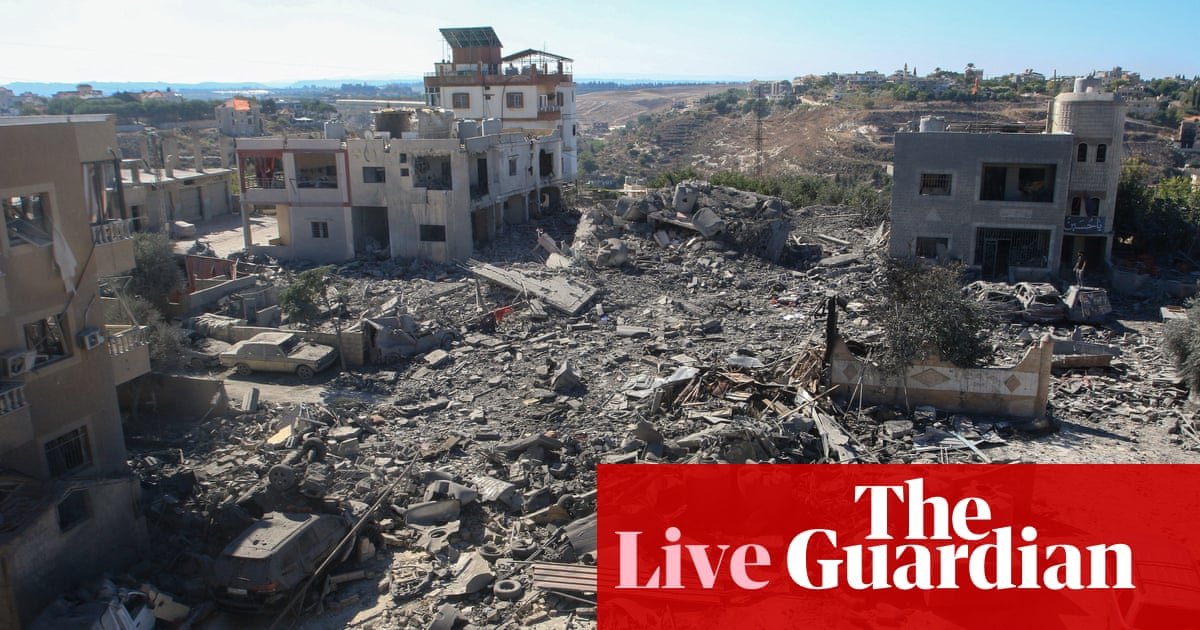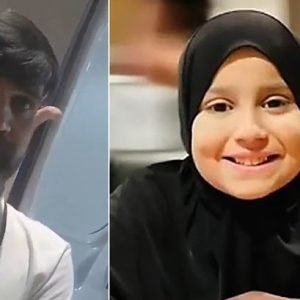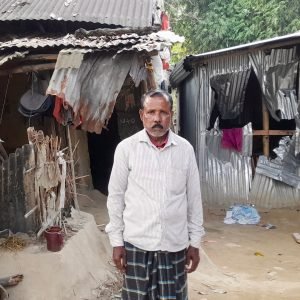
Lebanon says more than 1,500 killed in cross-border violence with Israel
More than 1,500 people have been killed in almost a year of cross-border violence between Hezbollah and the Israeli army, according to figures by the Lebanese government.
Figures released by Lebanon’s disaster management unit and reported by AFP show that 1,540 people have been killed, 60 of them in the past 24 hours. In addition, 5,410 have been wounded, it said.
Key events
White House says US ‘coordinated’ with Israel on ceasefire statement Israelis now reject
Summary of the day so far
Lebanon says more than 1,500 killed in cross-border violence with Israel
Israel says it secures $8.7bn US military aid package
Two killed in Israeli strike on Beirut, says health ministry
Israel to keep striking Hezbollah ‘with full force until we reach all our goals’, says Netanyahu
‘We now face the risk of an all-out war’ that could be ‘devastating’ for Israel and Lebanon, warns US defence secretary
Abbas urges world leaders to ‘stop sending weapons to Israel’
‘We will not leave’: Palestinian Authority president Mahmoud Abbas addresses UN leaders
Israel says it killed top Hezbollah air force commander in Beirut strike
Israel approves ‘continued IDF offensive activity’ against Hezbollah in Lebanon
US, UK, EU, UAE, Saudi Arabia, Qatar and others issue further joint statement calling for immediate Israel-Hezbollah ceasefire
Security minister Ben-Gvir says his party will quit Netanyahu’s coalition if permanent ceasefire with Hezbollah agreed
IDF announces it is carrying out ‘strikes in Beirut’
Israel’s foreign minister rules out US-French ceasefire proposal saying ‘There will be no ceasefire in the north’
23 Syrians killed, most of them women or children, in Israeli strike on Younine in Lebanon – mayor
Finance minister Smotrich rejects ceasefire proposal, says ‘crushing’ Hezbollah is only option
Northern Israel community leaders reject ceasefire plan, saying ‘this is a time for war’
France and US push for 21-day Hezbollah-Israel ceasefire in Lebanon
Opening summary
Joanna Walters The White House insisted this afternoon that a US-led international call for a ceasefire in Lebanon had been “coordinated” with Israel, despite Israel later rejecting the truce and vowing to keep fighting Hezbollah.
The statement was indeed coordinated with the Israeli side,” the White House press secretary, Karine Jean-Pierre, told reporters at the daily media briefing, in the west wing at the White House in Washington, DC, moments ago, Agence France-Presse (AFP) reported.
Jean-Pierre said talks were continuing at the United Nations General Assembly in New York.
Elsewhere at the White House, Ukraine’s president, Volodymyr Zelenskyy, has just arrived ahead of a planned bilateral meeting with Joe Biden at which he intends to present a “victory plan” to the US president, expected to include a request to use long-range US missiles to strike deeper into Russia – which has the US nervous of being dragged into direct conflict with Russia. Zelenskyy will then meet separately with the US vice president, Kamala Harris, who is the Democratic party’s nominee for president in this November’s election. There’s more on this in our US politics blog, which is following that news as it happens.
Here’s a recap of the latest developments:
Two people were killed and 15 others wounded, including a woman in critical condition, after an Israeli airstrike in Beirut on Thursday, according to Lebanon’s health ministry, taking the death toll from Israeli strikes in Lebanon overnight and during the day on Thursday to 28. Israel said it carried out a strike which it said killed one of the heads of the Hezbollah air force unit, Mohammad Surur.
Israel’s prime minister, Benjamin Netanyahu, said his country is striking Hezbollah “with full force” and will not stop until its goals are achieved. Netanyahu spoke to reporters as he landed in New York on Thursday to attend the UN general assembly, where protesters were arrested after calling for the Israeli leader to be arrested and for an end to US support for Israel.
The chief of the general staff of the Israel Defense Forces, Herzi Halevi, said the Israeli military will continue striking Hezbollah. Israel’s defence minister, Yoav Gallant, said he had approved the “continued IDF offensive activity” against Hezbollah in Lebanon. The head of the Israeli air force, Tomer Bar, said its top priority now is to prevent all weapons transfers from Iran to Hezbollah.
More than 1,500 people have been killed in almost a year of cross-border violence between Hezbollah and the Israeli army, according to figures by the Lebanese government on Thursday. In addition to the Beirut strike that authorities said killed two people, Israeli attacks in the Tyre district of Lebanon killed three people and wounded 17 others on Thursday, according to authorities. At least 23 people, all of them Syrian and most of them women or children, were killed in an Israeli strike on a three-storey building in the Lebanese town of Younine late on Wednesday, according to the mayor.
The US and France called for a 21-day temporary ceasefire between Israel and Hezbollah to make way for broader negotiations. A joint statement calling for “a diplomatic settlement” of the crisis was also endorsed by the UK, Australia, Canada, the European Union, Germany, Italy, Japan, Saudi Arabia, the United Arab Emirates and Qatar.
But Israeli ministers rejected the proposal for a ceasefire and demanded that the fight against Hezbollah continue. Israel’s foreign minister, Israel Katz, ruled out Israel accepting the ceasefire between Israel and Hezbollah, saying: “There will be no ceasefire in the north.” Finance minister Bezalel Smotrich insisted that continuing the war against Hezbollah was the only way forward. Interior security minister Itamar Ben-Gvir threatened that his party would quit Benjamin Netanyahu’s coalition government if a permanent ceasefire was agreed.
The US defence secretary, Lloyd Austin, warned that a full scale war between Israel and Hezbollah “could be devastating for both parties”. Austin urged both sides to accept proposals for a 21 day ceasefire, while on a trip to London to meet his British and Australian counterparts, John Healey and Richard Marles. The US secretary of state, Antony Blinken, said countries around the world were united in wanting a ceasefire between Israel and Hezbollah. Blinken is scheduled to meet with Israeli officials in New York on Thursday.
Israel said it secured a $8.7bn (£6.5bn) aid package from the US to support its ongoing military efforts and to maintain a qualitative military edge in the region. The announcement came after talks between Israel’s ministry of defense director general, Eyal Zamir, and the US acting under secretary for defence for policy, Amanda Dory, according to Israel’s defence ministry.
Qatar’s foreign ministry said there is no direct link between Gaza truce talks and calls for a ceasefire between Israel and Hezbollah. Foreign ministry spokesperson Majed al-Ansari said his government had received “horrific reports” from Lebanon about Israel “targeting whole families in a way that is similar to the atrocities in Gaza”.
Germany’s chancellor, Olaf Scholz, warned that the conflict between Israel and Hezbollah could spark a “regional conflagration”. Scholz met on Thursday with the Israeli opposition politician, Benny Gantz, who quit Israel’s war cabinet in June, citing a lack of a postwar plan for Gaza. Germany was among the group of nations that called “for an immediate 21-day ceasefire across the Lebanon-Israel border”.
Palestinian Authority president Mahmoud Abbas urged world leaders to stop the war in the Gaza Strip, saying Israel had almost entirely destroyed the Palestinian territory and it was no longer fit for life. Abbas, speaking at the UN general assembly on Thursday, urged leaders to “stop sending weapons to Israel”, adding that the Palestinian people “will not leave … Palestine is our homeland.”
At least 13 people were killed in Israeli strikes on the Gaza Strip on Thursday, according to the Palestinian news agency Wafa. Six people were killed when a missile struck a house in Khan Younis, and a further seven people were killed and others were injured in the bombing of Al-Faluja school in Jabalia, it said.
Gaza’s health ministry has accused the Israeli army of treating exhumed Palestinian bodies in an “inhumane” manner. It said the Israeli army deposited a container containing 88 dead Palestinians “without any data or information that could help identify” them. Israel rejected the accusation, saying that it treated the bodies of the deceased “with dignity and respect”.
An Israeli strike on Thursday hit the Syrian end of a small bridge that provides a crossing into Lebanon, according to Lebanese transport minister Ali Hamieh. Israel’s military said it targeted “infrastructure along the Syria-Lebanon border used by Hezbollah to transfer weapons from Syria to Hezbollah in Lebanon.” It said the weapons had been used by Hezbollah against Israeli civilians.
Norway’s police issued an international search request for a man linked to the sale of pages to Hezbollah that exploded across Lebanon last week. Rinson Jose, a Norwegian-Indian man, disappeared while on a work trip to the US last week. Jose, 39, is a founder of a Bulgarian company that was reportedly part of the pager supply chain.
More than 1,500 people have been killed in almost a year of cross-border violence between Hezbollah and the Israeli army, according to figures by the Lebanese government.
Figures released by Lebanon’s disaster management unit and reported by AFP show that 1,540 people have been killed, 60 of them in the past 24 hours. In addition, 5,410 have been wounded, it said.
The head of the Israeli air force said its top priority now is to prevent all weapons transfers from Iran to Hezbollah.
Maj Gen Tomer Bar, at a meeting with officers reported by the Times of Israel, said:
We in Lebanon are now going to prevent any possibility of weapon transfers from Iran, in the face of what we have taken away so far from Hezbollah.
The chief of the Israeli Air Force, Maj. Gen. Tomer Bar, says preventing all weapon transfers from Iran to Hezbollah is now a top priority.
“We in Lebanon are now going to prevent any possibility of weapon transfers from Iran, in the face of what we have taken away so far from… pic.twitter.com/2j9gt0tPnI
— Emanuel (Mannie) Fabian (@manniefabian) September 26, 2024 Gaza’s health ministry has accused the Israeli army of treating exhumed Palestinian bodies in an “inhumane” manner.
It said the Israeli army deposited a container containing 88 dead Palestinians “without any data or information that could help identify” them, AFP reported.
The ministry accused Israel of “exhuming graves and stealing bodies”, saying it held Israel “fully responsible for the inhumane and unethical treatment of the bodies”.
The Israeli army rejected the accusation, saying that it treated the bodies of the deceased “with dignity and respect”.
A spokesperson for the International Committee of the Red Cross (ICRC) said it was not involved in the transfer of the bodies to Khan Younis in southern Gaza because they did not have proper documentation. They said:
The Red Cross declined to participate in the reception of the bodies because it did not comply with the applicable protocols. There are no data, lists, or evidence identifying these bodies, and we have no information about them whatsoever. We emphasise the right of all families to receive information about their relatives and loved ones and to carry out burial ceremonies in a manner that respects human dignity.
Germany’s chancellor, Olaf Scholz, has warned that the conflict between Israel and Hezbollah could spark a “regional conflagration”.
“All parties have a responsibility to find a diplomatic solution,” Scholz said in a post to X after meeting with the Israeli opposition politician, Benny Gantz, who quit Israel’s war cabinet in June, citing a lack of a postwar plan for Gaza.
Hezbollah must withdraw from the border area of Lebanon. All parties have a responsibility to find a diplomatic solution. I spoke about this with @gantzbe. The conflict between Israel and Hezbollah must not become a regional conflagration. pic.twitter.com/xeV2zlOrTd
— Bundeskanzler Olaf Scholz (@Bundeskanzler) September 26, 2024 During a visit to Berlin, Gantz also met with Germany’s president, Frank-Walter Steinmeier, and other officials to discuss Israel’s war against Hamas in Gaza and Hezbollah in Lebanon.
Germany has joined a group of nations that called “for an immediate 21-day ceasefire across the Lebanon-Israel border”.
Norway’s police have issued an international search request for a man linked to the sale of pages to Hezbollah that exploded across Lebanon last week.
Rinson Jose, a Norwegian-Indian man, disappeared while on a work trip to the US last week, Reuters reported. Jose, 39, is a founder of a Bulgarian company that was reportedly part of the pager supply chain.
“A missing persons case has been opened and we have issued an international search for the person,” Oslo police confirmed to news agencies.
Hundreds of pagers and walkie-talkies detonated across Lebanon last week, killing at least 37 people and wounding nearly 3,000 in an attack widely blamed on Israel.
Bulgarian authorities opened an investigation after reports that a Bulgarian-registered company open by a Norwegian – Norta Global -had imported the devices and then delivered them to Hezbollah.
Norta Global was founded by 2022 by Jose, according to Bulgaria’s corporate registry.
Dan Sabbagh Lloyd Austin, the US secretary of defence, warned that a full scale war between Israel and Hezbollah “could be devastating for both parties” as he urged both sides to accept proposals for a 21 day ceasefire, on a trip to London to meet his British and Australian counterparts.
But the senior administration official declined an opportunity to say that there would be limits to US military support for Israel if it embarked on a ground invasion of Lebanon, focusing instead on emphasising the possible costs of full scale fighting to Jerusalem.
“A full-scale war between LH [Lebanese Hezbollah] and Israel could be devastating for both parties and it could lead to a larger conflict throughout the region,” Austin said at a press conference in Greenwich, south London. “That’s not in the best interests of anyone.”
Austin said he spoke to Yoav Gallant, Israel’s defence minister, frequently and was urging him to pursue “diplomacy in every step”. But when pressed if the US would consider withholding military support if Israel refused to agree to a truce and press ahead with a ground invasion, Austin demurred.
The defence secretary said the US had been “committed from the very beginning” to helping provide Israel with “things that are necessary for them to be able to protect their sovereign territory – and that hasn’t changed and won’t change”.
Israel said it has secured a $8.7bn (£6.5bn) aid package from the US to support its ongoing military efforts and to maintain a qualitative military edge in the region.
The package includes $3.5bn (£2.6bn) for essential wartime procurement, which has already been received and earmarked for critical military purchases, and $5.2bn (£3.9bn) designated for air defense systems including the Iron Dome anti-missile system, David’s Sling and an advanced laser system, according to Reuters.
The announcement came after talks between Israel’s ministry of defense director general, Eyal Zamir, and the US acting under secretary for defence for policy, Amanda Dory, according to Israel’s defence ministry. A statement from the Israeli ministry reads:
This substantial investment will significantly strengthen critical systems such as Iron Dome and David’s Sling while supporting the continued development of an advanced high-powered laser defense system currently in its later stages of development.
The ministry said the deal underscores the “strong and enduring strategic partnership between Israel and the United States and the ironclad commitment to Israel’s security”, particularly in addressing regional security threats from Iran and Iranian-backed militias.
The US secretary of state, Antony Blinken, said countries around the world were united in wanting a ceasefire between Israel and Hezbollah.
Blinken, in an interview with MSNBC on Thursday, pushed the US proposal for an immediate 21-day ceasefire, saying it would help bring about a longer-lasting diplomatic resolution. The US secretary said:
The world is speaking clearly for virtually all of the key countries in Europe and in the region on the need for the ceasefire.
He added that he would be meeting with Israeli officials in New York later today. Blinken is scheduled to meet with Israel’s minister for strategic affairs, Ron Dermer.
We reported earlier that Qatar’s foreign ministry spokesperson, Majed al-Ansari, held a press conference where he said there is no direct link between Gaza truce talks and calls for a ceasefire between Israel and Hezbollah.
Qatar is receiving “horrific reports” from Lebanon about Israel “targeting whole families in a way that is similar to the atrocities in Gaza,” al-Ansari also told reporters on Thursday.
He added that the Qatari government is seeing “no discrimination between civilian and militant in these attacks”.
Here are some of the latest images from Beirut, after Israel carried out a strike which it said killed one of the heads of the Hezbollah air force unit, Mohammad Surur.
Two people were killed and 15 others wounded, including a woman in critical condition, according to Lebanon’s health ministry.
The latest figure takes he death toll from Israeli strikes in Lebanon overnight and during the day on Thursday to 28.
A member of Israel’s prime minister Benjamin Netanyahu’s entourage said Israel “won’t go to a ceasefire now” amid an escalation with Hezbollah in Lebanon.
The subject did not come up in the cabinet meetings on Wednesday, the official told the Times of Israel, adding:
We are continuing the plan for the war that was approved by the prime minister.
The chief of the general staff of the Israel Defense Forces, Herzi Halevi, said the Israeli military will continue striking Hezbollah, after the IDF said it killed the head of one of the militant group’s air force units.
The Times of Israel’s Emanuel Fabian quoted Halevi saying:
We need to continue attacking Hezbollah, we have been waiting for this opportunity for years.
He added:
We are constantly working to achieve achievements, to eliminate more senior officials, to thwart the transfer of weapons, to [destroy] Hezbollah’s firepower [capabilities, and to attack it in all of Lebanon.
White House says US ‘coordinated’ with Israel on ceasefire statement Israelis now reject
Summary of the day so far
Lebanon says more than 1,500 killed in cross-border violence with Israel

Israel says it secures $8.7bn US military aid package
Two killed in Israeli strike on Beirut, says health ministry







